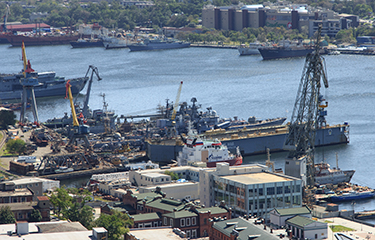Russian fishing companies have initiated a drive to support the development of the country’s boatbuilding and repair sector.
Delays at Russia's shipyards have become a bottleneck in the renovation of the country's fishing fleet, a major objective of the federal government, which has offered aggressive incentives to replace old vessels, including additional quotas for pollock and crab for companies that build new vessels at Russian shipyards. The first phase of the so-called quota-investment program resulted in the construction of 33 new pollck vessels, some of which have already been put into service, and 30 new crab vessels. The second phase is coming soon, with details still being discussed.
While Russia’s shipyards have increased their expertise and capacity in construction new fishing vessels, their ability to carry out maintenance and report on those vessels remains lacking, according to major Russian fishing companies. As a result, they're pushing for a government program to enhance the repair capacity at Russian shipyards.
In early August, the All-Russian Association of Fishing Industry (VARPE) contacted the Russian Ministry of Industry and Trade with a proposal to design a government program – to run through 2030 – to upgrade ship repair facilities to avoid a gap between the supply and demand. According to VARPE’s letter to the ministry, Russian shipyards and ship repair plants are capable of meeting only 15 percent of the repair and maintenance needs of the Russian fleet.
In the Far Eastern fishery basin, where nearly 75 percent of the national catch is harvested, the potential repair market is RUB 13 billion to RUB 15 billion (USD 181 million to USD 208.8 million, EUR 156.4 million to EUR 180.5 million) annually, VARPE said. Currently, most repair-work is carried out in South Korea, where 75 percent of Russian medium- and large-sized ships are serviced; followed by China, where 17 percent are serviced; and Japan, where 8 percent are serviced. The yearly demand for dock repairs in the Far East is 160 ships, VARPE said in the letter, while existing capacity limits Russian services to 60 vessels, as Russian shipyards are primarily equipped to service small-sized ships, and many are in urgent need of upgrades.
According to data from the Russian Union of Producers and Entrepreneurs, 80 percent of the equipment in shipyards and ship-repair facilities is overdue for replacement. In Murmansk – the center of Russia's northern fishery basin – only four plants can do the full scale of maintenance and repair work, including docking, and two of those are fully occupied with military contracts.
In 2018, The Russian Newspaper, a government-owned media outlet, reported that highly qualified workers in the Murmansk region prefer to work abroad, primarily in Norway, due to better pay. Partially as a result, Norwegian companies have developed a niche business servicing Russian ships, the newspaper reported.
According to a Russian Presidential Academy of National Economy and Public Administration (RANEPA) study, Russian repair companies can’t compete with foreign rivals on price and quality due to a lack of high-quality equipment.
VARPE suggested the Russian government support the establishment of a vessel-service center in the Kamchatka region, where the bulk of Russia’s national catch is landed. The project should be included in Russia's Fishery Industry Development Strategy 2030, VARPE said.
PortNews Development Director Nadezhda Malysheva told SeafoodSource the idea is a good one, but the challenge of modernizing Russia's ship-repair network is large.
“We don’t have enough docks,” Malysheva said. “We need modern technologies. Another big question is the supply of parts. Many of them are not manufactured in Russia, and at the same time, fisheries struggle to buy them abroad.”
A representative of pollock giant Russian Fishery Company (RFC), which fully committed to the investment-quota program by committing to the construction of 11 state-of-art supertrawlers, told Kommersant the company’s vessels are serviced in Russia, as it’s more economical and faster. In RFC’s case, equipment on the supertrawlers will be serviced through guaranteed maintenance contracts, but the new ships will likely not need any considerable repairs in the near-term, the RFC executive said.
Separately from its new vessels, RFC said it is still conducting routine maintenance procedures around Russia, with priority given to facilities in the Primorsk region, where the company is based. But the RFC official complained of inflated prices for repairs due to low competition.
NOREBO Group Deputy CEO Sergey Sennikov told Kommersant the company’s fleet is often serviced abroad, due to lower costs, higher quality of service, and the availability of spare parts. Sennikov said Russian ships use a lot of foreign-made equipment that’s serviced by producers based outside of Russia.
NOREBO has also ordered new ships under the investment-quota program, and Sennikov said he doesn't expect them to require significant repairs in the coming years. But he said a revitalization of Russia's service capacity is necessary, which will require the construction of new repair plants from scratch, equipped with modern technology and a new approach to management.
Russian authorities have been quick to respond to the proposal. In September, during a meeting with Russian President Vladimir Putin, Russian Ministry of Industry and Trade Head Denis Manturov voiced a proposal to zero the value-added tax (now 20 percent) for all ship-repair services.
Manturov said the national budget won't suffer from the proposal, as the services are now being provided outside the country, so Russian companies currently don’t earn any money that can be taxed. In response, Putin ordered Russian Finance Minister Anton Siluanov to consider the proposal.
“I don’t need an immediate answer,” he told Siluanov. “Think about it thoroughly. We would like to have our ships serviced at our shipyards. These areas, shipbuilding and ship repair, are important for us. We need to support them.”
The Ministry of Finance has not provided a timetable for its response, but directives from Putin are typically given high priority by Russian federal agencies.
Photo courtesy of Urri/Shutterstock







